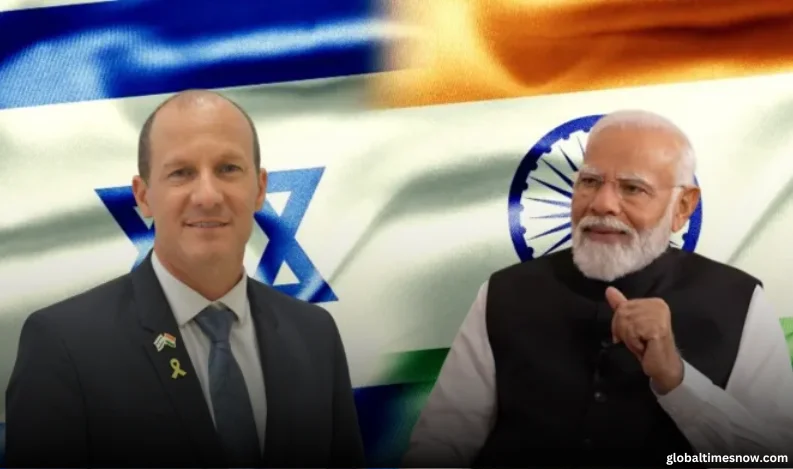New Delhi : Indian Prime Minister Narendra Modi was the first world leader to reach out to Israel following the deadly Hamas terror attack on October 7, 2023, Israeli Ambassador to India, Reuven Azar, revealed in an exclusive interview. Expressing gratitude for PM Modi's unwavering support, Azar highlighted the growing strategic partnership between the two nations.
India's Prompt Support to Israel
"We deeply admire Prime Minister Modi’s leadership and friendship. He was the first leader to call us following the October 7 attack, and we have seen his steadfast support over the past year and a half. Our nations share common perspectives and challenges, and I am confident that our partnership will only strengthen in the coming years," Azar stated.
The October 7 attack by Hamas resulted in the deaths of over 1,200 people in Israel, with 250 individuals taken hostage. The attack triggered an extensive Israeli military response in Gaza, leading to ongoing conflict in the region.
Military and Strategic Developments
Azar emphasized Israel’s military achievements in neutralizing threats posed by Hamas and other Iran-backed militant groups. He pointed out that Israel has significantly weakened Hamas’s military capabilities and disrupted Hezbollah’s ability to attack from Lebanon.
"Israel has successfully removed a major security threat from Hezbollah and disrupted Iran’s missile program at critical points. With Hamas’s military infrastructure largely dismantled, we are at a historic turning point," Azar asserted.
Situation in Gaza and US Mediation
Providing an update on the ongoing crisis in Gaza, Azar stated that Israel has managed to bring back nearly 190 hostages, with approximately 69 remaining in captivity. He reiterated Israel’s firm stance on ensuring Hamas is completely dismantled as a military and governing entity in Gaza.
On US President Donald Trump’s proposal to relocate civilians from Gaza, Azar remarked, "In conflicts worldwide, people move to safer locations temporarily. If any country is willing to provide refuge to Palestinians voluntarily, it should be considered."
Comparison of US Administrations
Discussing US-Israel relations, Azar noted differences between the Biden and Trump administrations. While acknowledging Israel’s strong ties with the US across different governments, he pointed out that the Trump administration had been more proactive in supporting Israel’s military actions and diplomatic initiatives, such as the Abraham Accords.
"The Trump administration’s stance is clear—full backing for Israel’s right to defend itself without restrictions. This is a significant shift compared to the previous administration," he observed.
Concerns Over Media Coverage and Radicalization
Azar criticized biased media coverage of the conflict, particularly highlighting certain Western and Middle Eastern outlets. "Radical Islamist groups often manipulate narratives through networks like Al Jazeera, and even some Western media outlets have individuals linked to extremist ideologies," he claimed. He also expressed concerns over Hamas affiliates disguising themselves as journalists to spread propaganda.
On the issue of radicalization, Azar stressed that Hamas’s indoctrination of Gaza’s youth has perpetuated violence and instability. "For lasting peace, we need to deradicalize the region and reform education to promote coexistence," he said.
India-Israel Strategic Partnership
The ambassador underscored the deepening India-Israel ties across sectors such as defense, technology, infrastructure, and trade. He praised India’s "Make in India" initiative, noting Israel’s active participation in defense manufacturing and joint ventures in areas like autonomous drones, ammunition, and surveillance systems.
"India and Israel are working together not only in defense but also in agriculture, innovation, and infrastructure. Recent high-level visits and business delegations reflect the momentum in our economic and strategic collaboration," he said.
He also highlighted Israel’s support for India’s inclusion in global connectivity projects like the India-Middle East-Europe Economic Corridor (IMEC) and the potential for India to acquire advanced military technology such as F-35 fighter jets.
Conclusion
Azar reaffirmed the strong diplomatic and strategic bond between India and Israel, attributing it to shared democratic values and common security interests. "Prime Minister Modi’s leadership has positioned India as a key global power, and we are honored to partner with India in shaping a secure and prosperous future for both nations."
With ongoing geopolitical shifts, the India-Israel partnership is expected to grow further, reinforcing cooperation in defense, trade, and regional stability.























